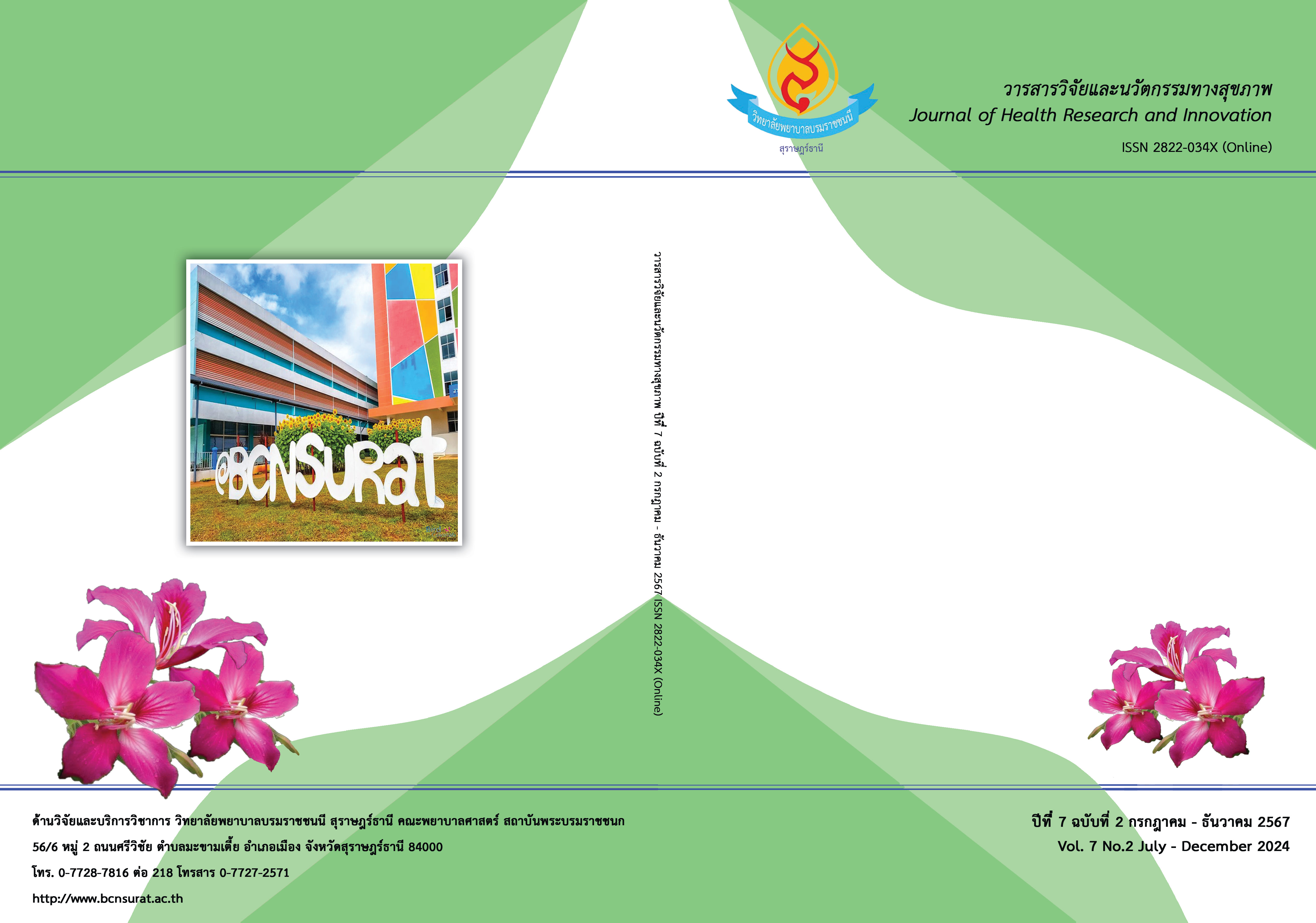ผลของการอบรมเชิงปฏิบัติการเพื่อส่งเสริมการเลี้ยงลูกด้วยนมแม่ต่อความรู้ ทัศนคติ และความตั้งใจในการเลี้ยงลูกด้วยนมแม่อย่างเดียว 6 เดือนของหญิงตั้งครรภ์
คำสำคัญ:
การเลี้ยงลูกด้วยนมแม่, การอบรมเชิงปฏิบัติการ, ความรู้, ทัศนคติ, ความตั้งใจบทคัดย่อ
งานวิจัยนี้เป็นการวิจัยกึ่งทดลองแบบตัวอย่างกลุ่มเดียว วัดผลก่อนและหลังการทดลอง มีวัตถุประสงค์เพื่อศึกษาผลของการอบรมเชิงปฏิบัติการเพื่อส่งเสริมการเลี้ยงลูกด้วยนมแม่ ต่อความรู้ ทัศนคติ และความตั้งใจในการเลี้ยงลูกด้วยนมแม่อย่างเดียว 6 เดือนของหญิงตั้งครรภ์ กลุ่มตัวอย่างเป็นหญิงตั้งครรภ์ที่อยู่ในเทศบาลนครหาดใหญ่ จังหวัดสงขลา จำนวน 25 ราย ดำเนินการอบรมประกอบด้วย 3 กิจกรรม ได้แก่ 1) การให้ความรู้เรื่องการเลี้ยงลูกด้วยนมแม่อย่างเดียว 6 เดือน 2) การแลกเปลี่ยนเรียนรู้เกี่ยวกับประสบการณ์การเลี้ยงลูกด้วยนมแม่ ปัญหาและแนวทางการแก้ไข และ 3) การฝึกทักษะการเลี้ยงลูกด้วยนมแม่ การเก็บรวบรวมข้อมูลด้วยแบบสอบถาม ได้แก่ แบบประเมินความรู้ ทัศนคติ และความตั้งใจในการเลี้ยงลูกด้วยนมแม่อย่างเดียว 6 เดือน ผ่านผู้ทรงคุณวุฒิพิจารณาความเหมาะสมของเนื้อหา และปรับปรุงตามข้อเสนอแนะ ตรวจสอบความเที่ยงของแบบประเมินความรู้โดยใช้คูเดอร์ริชาร์ดสัน-20 ได้ .70 แบบประเมินทัศนคติและความตั้งใจ ใช้วิธีหาสัมประสิทธิ์แอลฟาของครอนบาคมีค่าความเที่ยง .73 และ .86 ตามลำดับ วิเคราะห์ข้อมูลโดยใช้สถิติเชิงพรรณนาและสถิติการทดสอบค่าทีแบบสัมพันธ์
ผลการวิจัยพบว่า ภายหลังการเข้าร่วมอบรมเชิงปฏิบัติการหญิงตั้งครรภ์มีความรู้ ทัศนคติ และความตั้งใจในการเลี้ยงลูกด้วยนมแม่อย่างเดียว 6 เดือน เพิ่มขึ้นอย่างมีนัยสำคัญทางสถิติ (p< .001), (p< .001) และ (p< .01) ตามลำดับ ผลการวิจัยชี้ให้เห็นว่าการอบรมเชิงปฏิบัติการเพื่อส่งเสริมการเลี้ยงลูกด้วยนมแม่ครั้งนี้ ช่วยสร้างเสริมให้หญิงตั้งครรภ์มีความรู้ มีทัศนคติที่ดี มีความตั้งใจในการเลี้ยงลูกด้วยนมแม่อย่างเดียวเพิ่มขึ้น ดังนั้นบุคลากรสุขภาพสามารถประยุกต์ใช้เป็นแนวทางเพื่อการส่งเสริมการเลี้ยงลูกด้วยนมแม่อย่างเดียวให้มีประสิทธิภาพเพิ่มขึ้น
เอกสารอ้างอิง
Ajzen, I. (1991). The theory of planned behaviors. Organizational Behavior and Human Decision Process, 50, 179-211. https://doi.org/10.1016/0749-5978(91)90020-T
Bureau of Health Promotion. (2021). Aim for 2025 at least 50% of Thai children will be exclusive breastfeeding. https://hp.anamai.moph.go.th /webupload/ 4xceb3b571ddb70741ad132d75876bc41d/tinymce/OPDC/OPDC2564-F/IDC1_7/opdc_2564_IDC1-7_28.pdf (in Thai)
Chairat, N., & Kala, S. (2021). Intention of breastfeeding among mothers with cesarean section: The effects of a nursing program based on the planned behavior theory. The Southern College Network Journal of Nursing and Public Health, 9(1), 121-134. (in Thai)
Damchuti, I., & Kala, S. (2022). Factors influencing the success of a 6 month exclusive breastfeeding period among working mothers. The Southern College Network Journal of Nursing and Public Health, 9(1), 107-120. (in Thai)
Danthes, D. (2016). The effect of exclusive breastfeeding promotion program on attitudes and intentions about exclusive breastfeeding among pregnant working women outside the home. http://digital_collect.lib.buu.ac.th/dcms/files/53920034.pdf (in Thai)
Guo, J. L., Wang, T. F., Liao, J. Y., & Huang, C. M. (2016). Efficacy of the theory of planned behavior in predicting breastfeeding: Meta-analysis and structural equation modeling. Applied Nursing Research, 29, 37-42. https://doi.org/10.1016/j.apnr.2015.03.016
Kala, S., Khaonark, R., Tienmontree, K., Chairat, N., Sreepetch, S., & Damchuti, I. (2018). Development of a volunteer training program to promote breastfeeding in community. The Southern College Network Journal of Nursing and Public Health, 5(2), 16-29.
Khaonark, R., Kala, S., & Chatchawet, W. (2020). Perception in breastfeeding of postpartum mothers with newborns hospitalized in neonatal intensive care unit. Songklanagarind Journal of Nursing, 40(1), 30-44. (in Thai)
Kline, R. B. (2016). Principles and practice of structural equation modeling. (4th ed.). NY the Guilford Press.
Kling, D., Haile, Z. T., Francescon, J., & Chertok, I. (2016). Association between method of delivery and exclusive breastfeeding at hospital discharge. Journal of Osteopathic Medicine, 116(7), 430-439. https://doi.org/10.7556/jaoa.2016.087
Laongkeaw, N. (2016). Successful lived experiences of six months exclusive breastfeeding among postpartum mothers. http://kb.psu.ac.th/ psukb/handle/2010/10162 (in Thai)
Lau, C. Y. K., Lok, K. Y. W., & Tarrant, M. (2018). Breastfeeding duration and the theory of planned behavior and breastfeeding self-efficacy framework: A systematic review of observational studies. Maternal and Child Health Journal, 22(149), 1-16. https://doi.org/10.1007/s10995-018-2453-x
Ministry of Public Health. (2021). Exclusive breastfeeding percentage of newborns under 6 months. https://hdcservice.moph.go.th/hdc/reports/report.php?source=pformated/format1.php&cat_id=bebf866fceaef84c4078965
eaf619565&id=4164a7c49fcb2b8c3ccca67dcdf28bd0 (in Thai)
Murray, D. (2020). Breastfeeding when you or your baby are sick. https://www.verywellfamily.com/breastfeeding-a-sick-baby-431609
Pengjuntr, W. (2017). Driving the policy of breastfeeding in Thailand. http://hp.anamai.moph.go.th/article_attach/.pdf (in Thai)
Plodpluang, U., Srichan, A., & Kaewpraphan, S. (2016). The effect of breastfeeding promotion based on familial support program to knowledge, attitude and behavior of postpartum mothers and familiar’s members. Rajabhat Research Journal Science and Technology), 11(2), 41-52. (in Thai)
Polkhacha, W. (2022). The development of the breastfeeding model of the postpartum mothers in Selaphum hospital Roi-Et Province. Journal of Humanities and Social Sciences, 13(2), 125-138. (in Thai)
Tengku-Ismail, T. A., Wan-Muda, W. A. M., & Bakar, M. I. (2016). The extended theory of planned behavior in explaining exclusive breastfeeding intention and behavior among women in Kelantan, Malaysia. Nutrition Research and Practice, 10(1), 49-55. https://doi.org/10.4162/nrp.2016.10.1.49
Thai Breastfeeding Center Digital library. (2019). The benefits of breastfeeding for sick babies. https://library.thaibf.com/handle/023548404.11/493 (in Thai)
National Statistical Office of Thailand. (2020). Multiple indicator cluster survey 2019. https://www.unicef.org/thailand/media/5146/file/Multiple%20Indicator%20Cluster%20Survey%202019.pdf
Tharana, N. (2020). Breastfeeding. Green Life printing house. World Health Organization. (2020). Infant and young child feeding. https://www.who.int/en /news-room/fact-sheets/detail/infant-and-young-child-feeding
World Health Organization. (2023). Breastfeeding. https://www.who.int/health-topics/ breastfeeding#tab=tab_1
ดาวน์โหลด
เผยแพร่แล้ว
รูปแบบการอ้างอิง
ฉบับ
ประเภทบทความ
สัญญาอนุญาต
ลิขสิทธิ์ (c) 2024 วิทยาลัยพยาบาลบรมราชชนนี สุราษฎร์ธานี

อนุญาตภายใต้เงื่อนไข Creative Commons Attribution-NonCommercial-NoDerivatives 4.0 International License.
บทความที่ได้รับการตีพิมพ์เป็นลิขสิทธิ์ของวารสารวิทยาลัยพยาบาลบรมราชชนนี สุราษฎร์ธานี
ข้อความที่ปรากฏในบทความแต่ละเรื่องในวารสารวิชาการนี้เป็นความคิดเห็นส่วนตัวของผู้เขียนแต่ละท่านไม่เกี่ยวข้องกับวิทยาลัยพยาบาลบรมราชชนนี สุราษฎร์ธานี และคณาจารย์ท่านอื่นๆในวิทยาลัยฯ แต่อย่างใด ความรับผิดชอบองค์ประกอบทั้งหมดของบทความแต่ละเรื่องเป็นของผู้เขียนแต่ละท่าน หากมีความผิดพลาดใดๆ ผู้เขียนแต่ละท่านจะรับผิดชอบบทความของตนเองแต่ผู้เดียว



